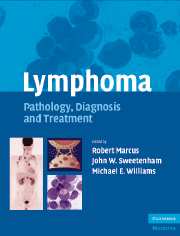Book contents
- Frontmatter
- Contents
- List of contributors
- Preface
- Part I LYMPHOMA OVERVIEW
- Part II LYMPHOMA SUBTYPES
- 7 Hodgkin's lymphoma
- 8 Follicular lymphoma
- 9 MALT lymphoma and other marginal zone lymphomas
- 10 Small lymphocytic lymphoma and its variants
- 11 Mantle cell lymphoma
- 12 Diffuse large B-cell lymphoma
- 13 Burkitt's and lymphoblastic lymphomas
- 14 Central nervous system lymphoma
- 15 T-cell lymphoma
- 16 Cutaneous lymphoma
- 17 Lymphoma in the immunosuppressed
- Index
- References
8 - Follicular lymphoma
from Part II - LYMPHOMA SUBTYPES
Published online by Cambridge University Press: 05 March 2010
- Frontmatter
- Contents
- List of contributors
- Preface
- Part I LYMPHOMA OVERVIEW
- Part II LYMPHOMA SUBTYPES
- 7 Hodgkin's lymphoma
- 8 Follicular lymphoma
- 9 MALT lymphoma and other marginal zone lymphomas
- 10 Small lymphocytic lymphoma and its variants
- 11 Mantle cell lymphoma
- 12 Diffuse large B-cell lymphoma
- 13 Burkitt's and lymphoblastic lymphomas
- 14 Central nervous system lymphoma
- 15 T-cell lymphoma
- 16 Cutaneous lymphoma
- 17 Lymphoma in the immunosuppressed
- Index
- References
Summary
INTRODUCTION
Follicular lymphoma (FL) is the second most common lymphoma after diffuse large B-cell lymphoma (DLBCL). It has an annual incidence of 4 per 100 000 and accounts for 30% of all cases of non-Hodgkin's lymphoma. The disease is generally characterized by the insidious onset of lymphadenopathy usually without extranodal disease or B symptoms. Although long-term disease-free survival is seen in some patients treated for early-stage disease the majority of patients are incurable with conventional therapy. Although usually readily responsive to treatment, remissions are temporary and the disease follows a relapsing and remitting course. Successive remissions become harder to achieve and of shorter duration. Most patients receive several lines of treatment before finally succumbing to refractory disease or high-grade transformation. In addition a small proportion of patients die from complications of therapy.
The behavior of follicular lymphoma shows considerable variability. In some cases the disease follows an aggressive chemo-refractory course, while in other patients the disease can be controlled for 15 years or more. This variable prognosis can be in part predicted by the recently devised FLIPI prognostic index and by sub-classification of the disease by gene expression microarray. This disease heterogeneity and the multiple lines of treatment received by most patients make treatment of follicular lymphoma a complex and contentious area. Little improvement in treatment outcomes had been seen over the last few decades and until recently median survival remained between 8 and 10 years.
- Type
- Chapter
- Information
- Lymphoma: Pathology, Diagnosis and Treatment , pp. 111 - 125Publisher: Cambridge University PressPrint publication year: 2007



